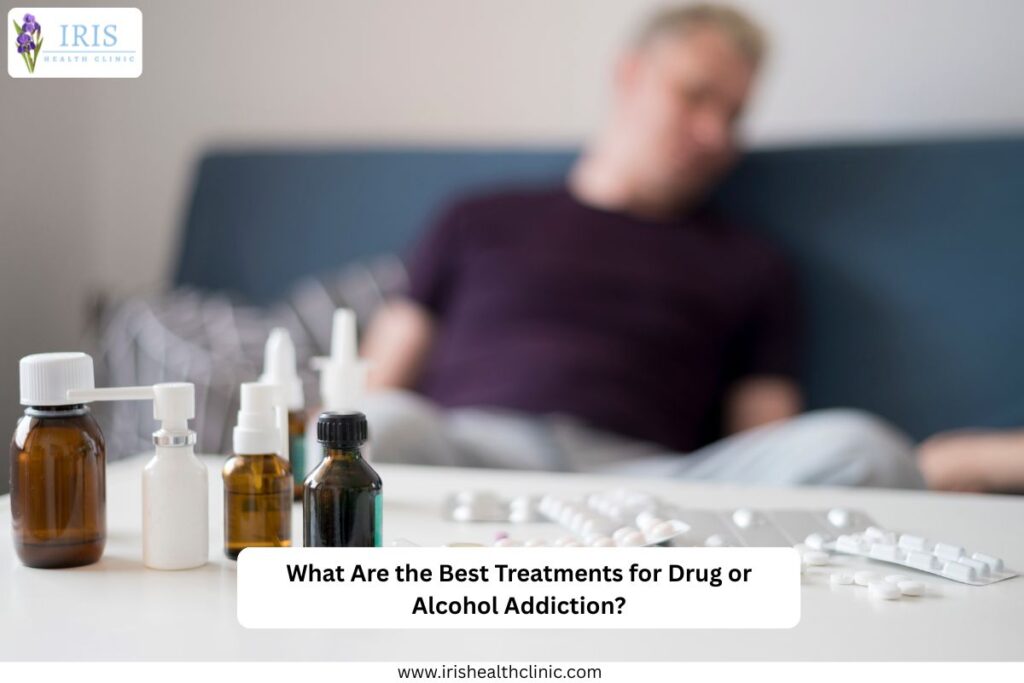Addiction to drugs or alcohol is a serious issue. It affects millions of people, does not pick or choose. It reaches across all walks of life. The National Survey on Drug Use and Health reported that in 2021, more than 46 million people aged 12 or older had a substance use disorder. That is a vast number of people struggling. Finding the right help matters. Recovery is possible, but it often takes professional guidance. A strong drug and mental health treatment center can be the first big step toward change. This blog breaks down some of the key parts of effective drug or alcohol addiction treatment in simple terms.
Why is therapy essential in treating addiction, not just detox?
Detox is usually the first step. It clears the substance out of the body. It helps manage withdrawal. But detox alone is not enough. It only deals with the physical side. Addiction runs deeper than that. Therapy is what gets to the root.
Here is why therapy matters:
- Digging into deeper issues: Many times, addiction is tied to trauma, stress, depression, or anxiety. Therapy helps people unpack these issues. Without facing them, relapse becomes likely. Outpatient dual diagnosis treatment is designed for people who have both addiction and mental health problems.
- Building new coping skills: Drugs or alcohol often act as a way to escape stress. Therapy teaches healthier ways to deal. CBT (Cognitive Behavioral Therapy) and DBT (Dialectical Behavior Therapy) are common approaches. They focus on handling triggers and negative emotions.
- Shifting mindsets: Therapy helps people see the thought patterns that feed addiction. It focuses on replacing harmful behaviors with healthier habits.
- Healing relationships: Addiction can damage your relation with your family and friends. Therapy gives people tools to work on communication and rebuild bonds.
- Staying on track: Therapy teaches relapse prevention. It helps people spot risky situations early. It also gives tools to get back on track if slip-ups happen.
Is addiction treatment the same for alcohol and drugs?
Each drug or alcohol addiction has unique effects on the brain and body.
Here are some key points:
- Withdrawal management: Alcohol withdrawal can be dangerous. It may cause seizures or delirium tremens. That is why medical detox is often needed. Medications help manage the risks. With drugs, symptoms depend on the substance. Opioid withdrawal is painful, though not generally fatal. Stimulant withdrawal can cause extreme fatigue and depression
- Medication-Assisted Treatment (MAT): A proven tool for opioid and alcohol addiction. Medications like methadone, buprenorphine, and naltrexone help with opioid cravings. Naltrexone, acamprosate, and disulfiram are used. MAT is usually combined with therapy for the best results. For other substances like stimulants or cannabis, research continues.
- Behavioral therapies: CBT, DBT, and Motivational Interviewing are common. But the focus changes. For stimulant addiction, therapy may focus on impulsivity. For opioids, pain management may be key.
- Long-term support: Groups like Alcoholics Anonymous (AA) and Narcotics Anonymous (NA) play a big role. Other groups exist for people with specific addictions. Outpatient dual diagnosis treatment is also helpful for people with co-occurring mental health issues.
In short, the principles are the same. But treatment must be tailored to the specific substance.

Why is follow-up care necessary after treatment?
Finishing rehab or outpatient treatment is a major win. But recovery does not stop there. Aftercare, or follow-up care, is what helps people stay steady long term.
Here is why it matters:
- Ongoing support: Once someone leaves a program, they go back to daily life. Old triggers may still be there. Aftercare provides steady guidance and accountability.
- Relapse prevention: Relapse is common. Aftercare teaches strategies to deal with it. That may include therapy sessions, group meetings, and regular check-ins with professionals.
- Handling challenges: There may still be mental health struggles, family issues, or job problems. Aftercare creates space to address these.
- Living sober: Recovery is not just about avoiding substances. It is about building a fulfilling life. Aftercare helps people find new hobbies and routines that support sobriety.
- Catching issues early: Regular aftercare makes it easier to spot warning signs. Small setbacks can be handled before they turn into full relapses.
Examples of aftercare include:
- Weekly or monthly therapy sessions
- Attending support groups
- Living in sober housing
- Medication management
- Career or study support
- Alumni groups from treatment centers
Are government or free rehab programs reliable?
For many people, government or free rehab programs are the only option. They can be reliable, but the quality varies.
Here are some things to think about:
- Accessibility: These programs are open to people who cannot afford private care. That alone makes them vital.
- Quality of care: Some offer excellent treatment. Others may struggle with limited resources. However, many dedicated professionals work in these programs.
- Waiting times: Free rehab often has waiting lists. This can be tough for people who need help incessantly.
- Services available: Free programs may not have all the therapies or resources that private centers do. But most cover the basics like detox, counseling, and support groups. A public drug and mental health treatment center may still offer solid, evidence-based care.
- Accreditation: Always check if the program is accredited and licensed. That ensures quality standards.
If you are considering one of these programs:
- Research the program’s reputation
- Ask about therapy options
- Check staff qualifications
- Learn about their aftercare plan
- Be ready for wait times
For both addiction and mental health issues, ask if the program offers outpatient dual diagnosis treatment.
What are the best treatments for drug or alcohol addiction?
There is no single best treatment. Factors like the substance, the severity, mental health conditions, and personal circumstances all shape the plan.
Here are proven approaches:
- Medical detox makes withdrawal safer and more comfortable
- Behavioral therapies are at the heart of recovery
- CBT helps people change harmful thought patterns
- DBT builds skills to handle strong emotions
- Motivational Interviewing builds commitment to change
- Contingency Management uses rewards to encourage sobriety
- For opioids and alcohol, MAT is effective. Medications reduce cravings and stabilize recovery.
- Residential drug programs: They provide structure in a live-in setting. They work well for people with severe addictions or unstable environments. A quality residential drug program offers medical care, therapy, and community support.
- Outpatient programs: These allow people to stay at home while receiving care. They suit those with milder addictions or strong support systems. Outpatient dual diagnosis treatment is especially useful for individuals with addiction as well as mental health issues.
- Support groups: AA, NA, and SMART Recovery provide peer support. They give people a sense of belonging and shared experience.
- Family therapy: Addiction affects loved ones, too. Family therapy improves communication and builds stronger home support.
The best treatment usually blends several of these.
Conclusion
Recovery is a journey. It is not quick, and it is not easy. But with the right treatment, it is possible. Therapy, MAT, and aftercare all play a role. Each person’s path looks different, but professional support makes a big difference.
At Iris Health Clinic, we focus on helping individuals and families in Wisconsin move toward a healthier life. Our drug or alcohol addiction treatment center is based in Waukesha and Milwaukee and serves the southeastern Wisconsin community. Our team works with substance use and mental health disorders. We offer residential treatment, extended care, outpatient programs, MAT, psychiatric medication management, evaluations, and therapy for everyone.
Always talk to your doctor or a qualified health provider for medical advice.

